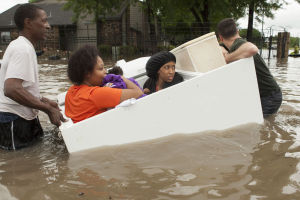 Many classic theologies feature their own versions of a “Great Flood” myth. In these fables, gods unleash their torrential fury upon sin-ridden populations, flushing out every trace of injustice in a planetary purge. When the chaos ends, humanity begins fresh aided by rosy skies and a clean slate.
Many classic theologies feature their own versions of a “Great Flood” myth. In these fables, gods unleash their torrential fury upon sin-ridden populations, flushing out every trace of injustice in a planetary purge. When the chaos ends, humanity begins fresh aided by rosy skies and a clean slate.
How sharply this contrasts with the aftermath of real floods—a mess of rubble and human debris. How does Noah’s struggle compare to that of New Orleans, now a decade along in its post-Katrina plight? One would think such catastrophes leave little room for illusions.
And yet, capitalism boasts its own “Great Flood” narrative. But whereas the others involve god actually erasing evil, this one merely shields it from public view. For so sayeth capitalist ideology: “Flood disasters are just ‘natural,’ without any culpability shared by the ruling class!”
To expose this mythology, a study of recent events in Texas will suffice. In late April, Houston endured downpours described by many news outlets as “epic.” The facts certainly fit the label—around 20 inches of rain, several deaths, a thousand ruined homes and at least $5 billion in damage. Other counties in the surrounding area suffered similar conditions, prompting Governor Greg Abbott to declare a state of emergency.
Startling though this data may be, it only paints a broad picture. To pinpoint this tragedy’s class stratification, we have to look closer. For example, did the wealthy and the impoverished experience its consequences equally?
The story of Greenspoint, one of Houston’s poorest districts, may provide our answer. One in every three residents of Greenspoint fails to meet the federal poverty line and 85 percent of the area’s housing consists of aging, dilapidated apartment complexes. In addition, 72 percent of its multi-family abodes reside in flood zones. All of this forms a recipe for frequent climatic misfortunes. As expected, the recent deluge wrought havoc upon Greenspoint, and those impacted the most also possess the fewest resources to recover. This district serves as a microcosm for many of capitalism’s failures—inexcusable city planning, widespread poverty and only-just-livable housing.
But why, one might ask, don’t they simply demolish these residences and erect safer alternatives? Because this would invite one of capitalism’s other recurring woes—unaffordable housing. The apartments in Greenspoint might be many unsavory things, but they’re also cheap.
Such compromises arise when basic need becomes a matter of currency. Clearly, flooding under capitalism goes beyond mere natural calamities. The system imposes artificial danger on the already-vulnerable, the already-exploited, and fails to offer a meaningful solution within its own confines. Only a revolution spearheaded by the working class, which places the creation and control of wealth into the hands of the public, can measure up to the task.
Unlike the green pastures that emerged from Noah’s flood, this socialism won’t be a utopia. But it will be the worthiest cause ever pursued in our brief history.





